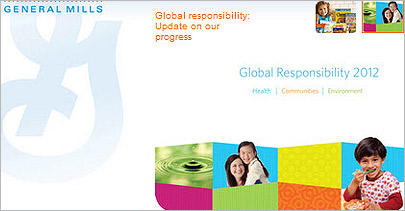research
General Mills Heads 'Most Reputable' Rankings
- by Karlene Lukovitz @KLmarketdaily, April 6, 2012

General Mills has unseated Amazon as the company perceived as “most reputable” by U.S. consumers, according to the Reputation Institute’s 2012 U.S. RepTrak Pulse, which measures the country’s 150 largest public companies as perceived by consumers and other stakeholders.
The Reputation Institute’s study is the basis of Forbes magazine’s annual “most reputable companies in America” rankings.
General Mills earned the #1 spot with a Pulse score of 83 (within an index of 0-100). After just missing the top 10 in 2010 and 2011, the company saw a significant, 6-point improvement in its score this year. It scored strongest in three of the seven reputation-driving factors or dimensions employed in the study: products and services, governance and leadership.
advertisement
advertisement
This year’s top 10 includes multiple food/beverages and CPG products companies. Kraft Foods ranks #2, with a score of 80 (down 1 point versus 2011); Johnson & Johnson is #3, at just shy of 80 (also down a point); Kellogg is #4 at 79.1 (down nearly 2 points); Coca-Cola Company is #7 at 78.1 (down 2 points); PepsiCo is #9 at 77.6 (up 2.5 points); and Procter & Gamble (which was #21 last year) is #10 at 77.3 (up nearly a point).
The others in the top 10 are: Amazon.com, now #5 at 78.6, a decline of 4 points versus 2011; UPS at #6 (78.4, down 2 points); and Apple at #8 (77.7, up nearly 5 points).
Five companies that did not make 2011’s top 10 are in 2012’s top 10: In addition to General Mills, these include Coca-Cola, Apple, PepsiCo and P&G. Companies that made last year’s top 10 but not this year’s include 3M, Sara Lee (now #11), Walt Disney Company, FedEx and Google.
Corporate reputation scores were down overall in comparison with 2011. Nine in 10 companies (91%) saw their scores stay the same or drop.
The biggest decliners were Time Warner (-10 points), Bank of America (-10), MR (-9), Altria (-9) and UAL.
The strongest improvers, in addition to General Mills, included AIG (+16), ExxonMobil (+7) and Abbot Labs (+6). The companies seeing the
largest gains were generally viewed by the public as turning in strong financial performances, while doubling down on successful citizenship efforts.
The top individual companies in terms
of specific reputation dimensions include Amazon.com, Apple and General Mills. Amazon.com wins in both products and services and governance (for the second year in a row). Apple places first in
innovation (now three years running), leadership, performance, and workplace. Overall, #1 General Mills places first in citizenship and placed in the top 10 across all seven dimensions measured.
The overall industries with the highest average scores are consumer products (74.52), food-manufacturing (73.52), industrial products (73.36), computer (73.2) and transport/logistics (71.9). Low-scoring industries include tobacco (44.6), financial/diversified (52.2), financial/bank (57.3), energy (58), telecommunications (60.7) and airlines and aerospace (61.4).
Factors Driving Reputation and Consumer Behaviors
The top three drivers of corporate reputation with the U.S. general public remain products and services (17.5%), governance (15.6%) and citizenship (14.2%). These drivers have remained consistent for the past five years.
However, company or “enterprise” perceptions have a 60% influence on critical consumer behaviors including purchase consideration, loyalty and recommendation behaviors, whereas product perceptions account for just 40% of these behaviors.
The Reputation Institute points out that since 2009, U.S. companies have been competing in a new “Reputation Economy” in which “who they are” matters even more than what they produce. Companies that excel at both, and convey “a differentiated, enterprise-wide story that translates into employee ambassadorship and earns marketplace support from external audiences” are the emerging leaders in this Reputation Economy, stresses Anthony Johndrow, managing partner of the institute.
Direct experience with a company remains the strongest influencer of consumer perceptions. Regardless of a company’s reputation score, consumers who had a direct experience with a company or heard from the company rated that company higher than those with which they had no direct experience.
What a company says or does -– including its marketing, advertising, public relations and “social responsibility” –- is the second-largest influencer of perceptions. What others say about a company (traditional/social/online media, friends/family, top experts, leaders) is third most influential.
Within the “what others say” category, however, social media are most influential. Online-only media and mainstream media are second- and third-most influential, respectively.
Corporate Reputation Strategies
The Reputation Institute also interviewed “chief reputation officers” (CEO, CMO or chief communications officer) from the 150 companies about their reputation strategies. Some of the findings:
- The 24% of companies that are farthest along in what the institute describes as the “five-phase reputation management journey” now invest more than 40% of their annual budgets on corporate reputation -- a 200% difference versus all other companies
- 51% of those leading companies report that the CEO’s office is the primary functional leader responsible for setting reputation strategy
- Nearly all (96%) of the advanced companies build reputation priorities into annual business planning
- 41% of these leading companies use reputation as a key performance indicator




